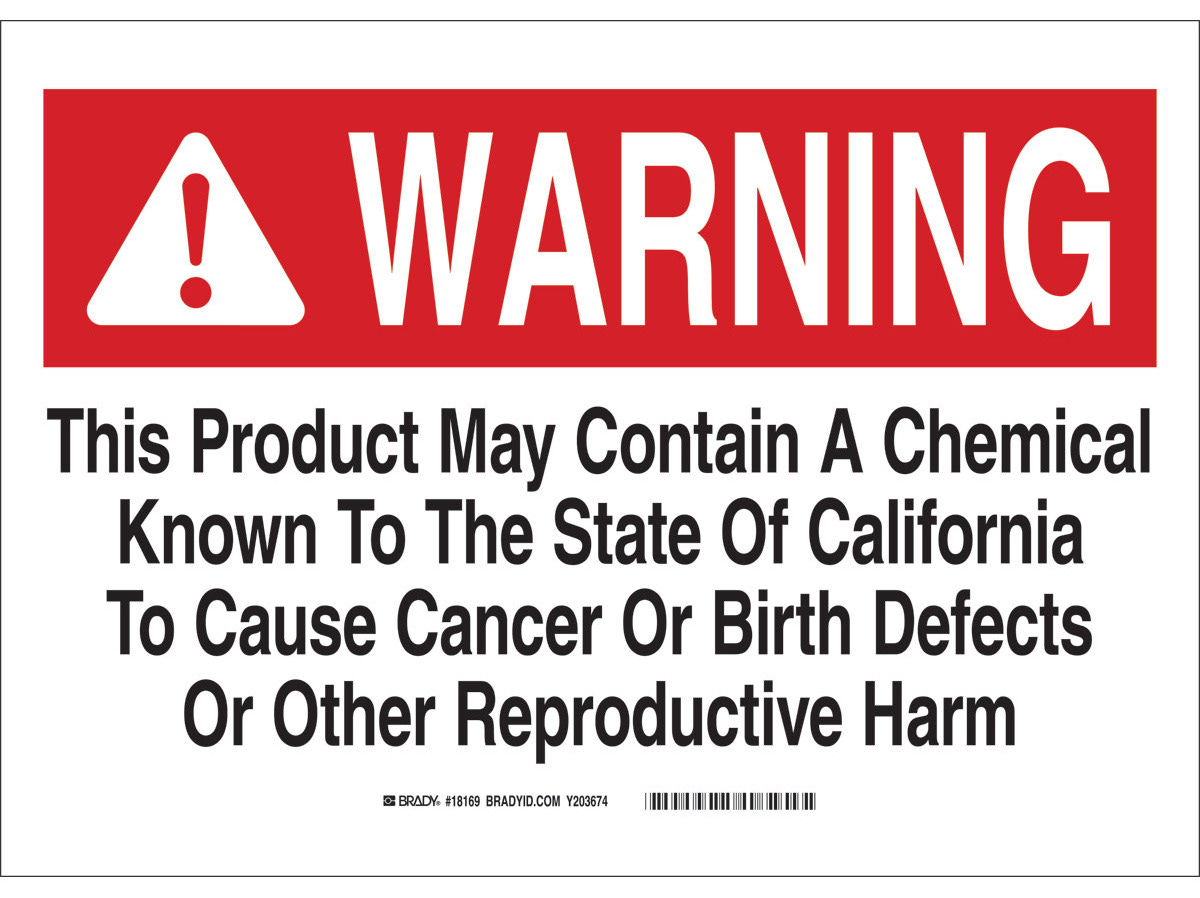Those California Cancer Labels Are Working!
Turns out companies don't like telling customers that their products have carcinogens and reproductive toxins.
Hello! I would like to direct your attention to this NY Mag story on Quince and its shady practices. My contribution is near the end of the article. It does mention how they tried to shut me up with a cease and desist. And failed. (Hair flip.)
Also, for my paid EcoCult members, I’m trying out a thing where I share unique, gorgeous, natural, and artisan brands that I’ve recently discovered. That’s after today’s article, and before I get into the weekly Good Reads. Tell me what you think!
Last year I bought a small wood chipper to use in my backyard. It’s meant to help augment the compost pile with brown material, is by the brand Earthwise, and is literally green colored. They really laid that eco marketing on thick. (By the way, I don’t recommend trying to process an entire dead plum tree’s worth of branches through this thing. I survived, but barely.)
Still, the thing is mostly plastic. When I unboxed it, it had that new-plastic odor, and came with a label you’re probably very familiar with.
Of course I put it back in the box and sent it right back.
Just kidding. I decided that I was not likely to find a carcinogen-free, plug-in electric, consumer-sized wood chipper unless I scoured Facebook marketplace for a year. And as this one would be stored in the barn, I shrugged, put it together outside, and held my breathe if I had to put my face close to it.
That’s an entirely different calculation than the one I would make for clothing, linens, children’s toys, kitchenware, and indoor furniture, however.
This decision—am I comfortable with this consumer product that contains toxic chemicals?—is one that millions of consumers now make based on legally-mandated information sharing. And that is exactly why Prop 65 in California was passed.
But this isn’t just about stressing you out with yet another decision. According to two studies from the Silent Spring Institute, Prop 65 is actually working to protect all Americans, not just Californians, from toxic chemicals, by getting chemicals out of products altogether.
In other words: yes, you should pay attention to those labels. They do mean something. But even if you don’t give a flip, you’re benefiting from them anyway.
What Is Prop 65?
As I write in my book on toxic fashion, California’s Prop 65 legislation requires brands to put a warning label on any product containing toxic chemicals like formaldehyde, lead, cadmium, some phthalates, and BPA. If someone discovers through testing that a product contains one of these substances, yet it doesn’t come with a label saying it’s carcinogenic or reproductively toxic, they can file a notice with California and then sue.
Prop 65 is frequently derided as overzealous. "Everything has Prop-65 warnings. Tanks of oxygen even require Prop 65 warnings in California,” one Redditor says. Disneyland, parking garages, therapists’ offices, they all have labels.
You could look at the ubiquity of these warnings and decide that the warnings are crazy. Or, you could look at the ubiquity of these warnings and realize that we’re probably breathing in toxic fumes all day. A parking garage is full of motor oil and particulate matter from tailpipes. A newly renovated office has VOCs off-gassing from every surface. Disneyland is probably full of all of the above.
(Side note: If even one parent sees that warning and decides to take their kids to a national park next time, I consider that a win.)
“Unfortunately, the most visible component of the law is the warnings. [They] can sometimes be useless and, you know, borderline silly,” Howie Hirsch at Lexington Law Group told me. He compared Prop 65 to an iceberg; the labels are the tip poking out of the water. “Most of what happens as a result of Prop 65 happens underneath the surface.”
That’s because a gas station doesn’t care if it has to display a warning label. Nobody would be surprised that a place that smells like gasoline is probably a little (or a lot) toxic. But fashion, bedding, home, mattress, food, and children’s companies do not want to tell their customers that their products contain carcinogens or chemicals that can cause birth defects.
Hirsch’s firm, representing the Oakland-based consumer advocacy group Center for Environmental Health (CEH), sued and extracted two settlements, one in 2009 and the next in 2010, from almost one hundred retailers that sell in California, including Target, Kmart, Guess, Michael Kors, Calvin Klein, Forever 21, JCPenney, Kohl’s, Kate Spade, Macy’s, Saks Fifth Avenue, Victoria’s Secret, and Walmart.
The retailers agreed to get lead out of their products.
In spring 2022 alone, notices were filed against the retailers Five Below, Target, Ross Stores, Revolve, Nordstrom, Walmart, Burlington, T.J.Maxx, Jo‑Ann, Amazon, and Macy’s—some of them a half dozen times—for selling items like kids’ backpacks and umbrellas containing endocrine-disrupting phthalates. Steve Madden and Vera Bradley were also dinged for selling products with phthalates. Ironically, they were found in Fjallraven’s “eco” travel backpack.
Prop 65 is also the reason why we know that polyester-spandex workout gear can have high levels of BPA. This law incentivizes advocacy organizations to pay for (very, very expensive) testing to find these things out, and publicize the results.
Prop 65 has a few notable loopholes. A company has to have at least ten employees in California to be targeted. So if you buy from a random “brand” that is just an Asian factory advertising to you on TikTok, Prop 65 won’t protect you. This is why I always tell people to avoid ultra-fast fashion.
Still, this is all anecdotal evidence. What we need is a peer-reviewed study showing the actual effects of this law on our chemical exposure through consumer products.
And now, we have two!
Thank you, California. Love, Americans
A study published on February 12th shows that Prop 65 has prompted some of the largest consumer product businesses in the world to reformulate products for not just California, but the national market and even international markets in some cases.
The researchers conducted interviews with business leaders at major global retailers and manufacturers in more than a dozen sectors, including home improvement, clothing, personal care, cleaning, and healthcare. More than three-quarters of the interviewees said Prop 65 had prompted them to reformulate their products. Four out of five said they look at Prop 65’s listed chemicals and try to avoid them when formulating products or purchasing raw materials. And 63% said Prop 65 leads to reformulation of products sold outside of California, too.
This is great because it shows that even unaware and apathetic consumers are being protected by Prop 65. That bro in Texas who likes to talk shit about Californians and their hippie food? His pungent cologne is less likely to contain hormone disrupting chemicals. You are welcome, my dude.
Non-toxic products for all!
Another study published last fall evaluated changes in blood and urine concentrations of 37 chemicals, including phthalates, phenols, VOCs, metals, and PFAS. It found that concentrations of these chemicals generally declined nationwide over time. For example, BPA concentrations decreased on average by 15% after it was listed on Prop 65. Meanwhile, BPS, a less notorious and unlisted chemical which manufacturers sometimes substitute in for BPA, increased 20% over this same period. Californians generally had lower levels of certain chemicals than the rest of the U.S. population.
Taken together, these two studies, which were both funded by the nonprofit Silent Spring Institute, show that Prop 65, even without outright banning these chemicals, is working.
In recent years, the law has been updated to require the label to say which chemical it’s about. So now you see warnings that say clothing may contain lead, or that food may contain phthalates. That’s even harder to ignore.
With the EPA currently being gutted and hobbled –– and more huge cuts on the way –– this research showing that a state law can protect all Americans from exposure to hazardous chemicals provides a little ray of hope for those of us who want to live in a healthier world.
New Brand Discoveries
I’m starting a new little section where I share new-to-me, unique, sustainable brands. I used to do this on EcoCult.com, but it was a lot of work for no financial reward, and unsustainable. Now that I have so many supporting members, I can start doing it again! I hope you enjoy.






